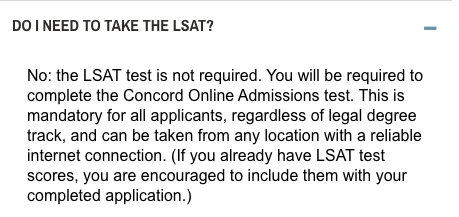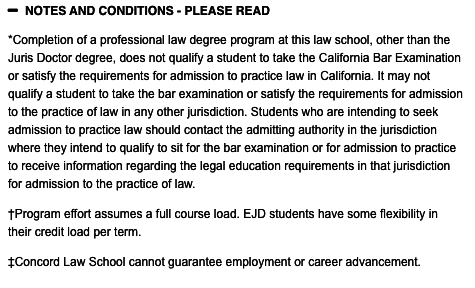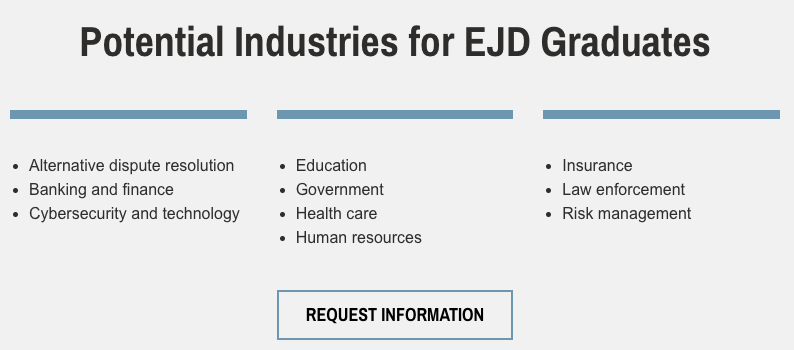What if you spent three years in law school, taking classes in contracts, torts, and constitutional law, and paying more than $11,000 a year, but — here’s the twist — at the end of it you weren't a lawyer? That's what a small number of online law schools are offering with a degree called the Executive Juris Doctor. The schools explain upfront that students won't be eligible to practice law but can use their “advanced legal training in one of the many law-related areas.” Yet many students find that what seems like it could be a leg up amounts to little more than an expensive education in the difference one letter makes.
“I finished July 26 and am looking for a job. I could scream because instead of getting a JD degree qualifying me to take the California Bar, I settled for the underdog degree, EJD. This is a non-bar attorney degree. No one knows what the f--- it is and trying to describe it makes you look like a goddamned fool. Yeah, I screwed myself it appears,” Copperas Cove, Texas, resident Brenda Cuney told BuzzFeed News.
In 2019, Cuney received her degree from Concord Law School, an unaccredited online law school based in Los Angeles, which since 2018 has been part of Purdue University Global, the online arm of the public university in Indiana. She took out the full cost of tuition, fees, and living expenses in student loans, hoping that after she graduated she would land a solid paralegal position. Concord’s website promised to “enhance your career by developing legal expertise.” But in the end, she was left with a degree few — if any — employers recognized, no more of an ability to become a paralegal than when she started, and more than $60,000 in loans (on top of existing debt for her bachelor’s degree). She now works as a substitute teacher, earning roughly $80 per day.
And even though Concord was clear with Cuney about the limitations of the program, legal experts aren’t clear why the program is offered at all. There’s no such thing as an Executive Dentist’s degree, after all (at least that we know of) — where students take dental classes but can’t become dentists. Concord’s EJD program seems built to take advantage of prospects like Cuney — admitting applicants whose test scores are too low for Concord’s JD program, but charging them almost the same tuition to attend the same classes taught by the same instructors, sitting in many of the same online rooms with JD students. The only difference? EJD students like Cuney won’t be allowed to become attorneys at the end of the program.
"It is definitely a made-up thing.”
And while few in the legal education community have heard of the EJD, those whom BuzzFeed News contacted raised concerns about whether the school was exploiting students like Cuney by offering the degree. Bob Shireman, formerly deputy undersecretary of education for then-president Barack Obama and now senior fellow and director of higher education excellence at the Century Foundation, said, “I asked my wife, who is a lawyer, and one of my colleagues [about the EJD] and they were like, what? That seems misleading. Or wrong. Or inappropriate. I looked at the [Law School Admission Council] list of types of law degrees, and it’s not there. There’s JD, LLM, legal certificate programs, MS. It is definitely a made-up thing.”
“When I turned 50, I realized I really haven't done anything of what I wanted to do, and maybe I should think about going back to school,” Cuney said. In 2012, Cuney, who has been working in risk management at a Temple, Texas, hospital, enrolled in a bachelor’s program at Kaplan, after which she contemplated earning a Master of Legal Science degree. “Then I thought, well if I’m going to do that, then why don’t I go to law school?” She looked at online JD programs, as she still had to balance school with work.
“At the time that I was looking at it and researching it, I didn't know a lot about accreditation versus non-accreditation of law schools. And I certainly didn't know about the EJD.”
Within a few days of taking a Concord-administered exam that it calls a “mini-LSAT,” which it requires of both its JD and EJD applicants in lieu of the standard LSAT exam, Cuney was informed she had been accepted into Concord’s EJD program instead of the JD.

“Well, my heart sunk. My thought was, apparently you're stupid. You're not cut out to go to the JD is what they're trying to tell you.” (Concord confirmed that its EJD program requires lower scores on the exam than its JD does.)
Looking back, she feels like she “just kind of got coaxed and talked into doing this EJD program.”
Cuney’s experience does not seem to have been unique to her. In one online review, a former student said, “In my opinion, we EJD students were viewed as lesser, JD unqualified and JD wanna-be students.” Another student who planned to drop out of the program wrote, “I study a modified version of the JD track and could earn a degree of uncertain value after three years...I will get as much by reading them on my own.”
In 2015, Cuney took out the full cost of attendance in federal student loans and enrolled.
The menagerie of law degrees is complex. There’s the standard Juris Doctor, which is what almost all aspiring attorneys in the US enroll in. There’s the post-JD Master of Laws (also called an LLM), which typically takes one year and often sought by foreign lawyers looking to practice in the US, as well as post-JD research doctoral programs. There are also master’s degrees in legal studies — for students who are not lawyers — that provide an academic background in law, often over the course of one year, but don’t allow students to sit for the bar exam, the state-by-state test that allows a person to work as a lawyer. Then, there are narrowly focused certificate programs provide training in specific areas of law, designed for people who want to work as, say, tax professionals or in human resources, which help train workers who are not lawyers but who do work with the law regularly. Although the group is complicated (these are lawyers, after all), it is established and well understood.
An Executive Juris Doctor, by contrast, is not. The EJD program is a roughly three-year commitment of time and money — the exact length as many JD programs (although Concord’s JD takes four years) — the completion of which does not make EJD students eligible to sit for the bar exam in any state, which means they are unable to practice law despite sitting in many of the same classes as JD students. What students are able to do with the EJD that they couldn't have done without it is unclear.
In 1998, the for-profit education company Kaplan — then a subsidiary of the Washington Post Company, which ran the newspaper — launched the Concord University School of Law, the country’s first online law school. A year later, it created the Executive Juris Doctor program.
Jack Goetz, the founding dean and former president of Concord Law School, said he started the EJD program to solve a problem he saw with non-JD programs. He told BuzzFeed News that some schools were handing out so-called non-bar JDs, although he said, “I cannot remember which schools did that.”
“We thought that practice was deceiving — as often the ‘non-bar’ did not make it to the transcripts. So, when we went into the market with a JD that was non-bar, we called it an Executive Juris Doctor — as a means of creating a distinction that was non-existent in the marketplace,” said Goetz, who now works at the University of Southern California.
In the years since its creation, the EJD has not spread widely, either in the legal industry or education. The degree is not offered by any of the country’s most selective law schools nor the largest ones. The degree also seems all but completely unknown among employers.
“I don’t think anyone is demanding it,” said Nathan Peart, managing director in the associate practice group of the legal recruiter Major, Lindsey & Africa. Peart hadn’t heard of an EJD before speaking to BuzzFeed News.
Yet there is one need the EJD seems to fulfill: Enrollment in JD programs has fallen over the last decade, according to data from the nonprofit Law School Transparency. The financial pressure from that decline, according to the group, “has been relieved at some law schools by growth of non-JD programs, whether post-JD programs, masters-level programs aimed at nonlawyers, or certificate programs.”
As the American Bar Association and other law industry organizations don't regulate or oversee EJD programs, they do not track the number of schools that offer the EJD, but at least two other online law schools offer it: Taft Law School in Santa Ana, California, (which offers a three-year “Juris Doctor-Executive Track” program) and Novus Law School, registered in the Marshall Islands (its EJD program takes 22 months).
And while Concord and Taft offer legitimate classes, Novus has been accused of being a diploma mill. I reached out to Novus from my personal email account using my real name inquiring whether its students could sit for the bar exam, if classes were taught live, and how many students had completed Novus’s EJD program. I later reached out from my work email requesting an interview. A Novus representative replied in an unsigned email that included a threat:
We do not authorize, permit, or allow the use of the Novus University name, site, information, emails, or additional information obtained under false pretenses, to promote buzzfeed.com which would result in hits, links, views, and other stories and would increase financial revenue and ranking for your site at our expense.
If you have an actual story that you are writing, then it is recommended avoiding legal litigation to forward your “story” or writing before posting. Our legal department will seek financial restitution and legal action against yourself and buzzfeed.com. for any listing, promoting, false, and or defamatory use of any unauthorized listing of the Novus University name or program.

“Do you want to develop the knowledge and skills of a lawyer without becoming one? Concord Law School’s Executive Juris Doctor (EJD) is a professional law degree program designed to help you build a solid legal background you can call upon within your current profession or in a new one,” states Concord’s website, which names “law-related areas that don’t actually require a bar license, including mediation, nongovernmental organizations, higher education, or human resources” as potential job categories for graduates.
Over the two decades Concord has been in operation, more than 860 students have graduated from the EJD program, presumably to go on to all manner of professions except attorney. LinkedIn shows EJD graduates in jobs such as program manager, compliance manager, legal nurse consultant, paralegal, and human resources professional. According to the school, EJDs have historically comprised nearly half of Concord’s student body. Thirty-two EJDs made up nearly half of Concord’s graduating class this past February (there were 37 JDs). Currently, there are 176 EJD students, about 41% of total enrollment. The average age of Concord’s students is 48, and 73% take out some amount of loans to finance their education.
The barriers to attending Concord’s EJD program are low compared to traditional law school. Prospective JD and EJD students don’t take the LSAT — the standardized exam required by ABA-accredited law schools. Instead, they take Concord’s free, 90-minute “mini-LSAT” that consists of 40 multiple-choice questions. Concord told BuzzFeed News it admits 80% of EJD applicants and nearly 50% of JD applicants. Some students whose scores aren’t high enough for Concord’s JD program are instead offered admission to the EJD program, although the school said it does not track how often this happens.

The average annual tuition for the EJD is $11,880, about the same cost as a year in Concord’s JD program. That’s far less than tuition at most law schools — one of the major draws of online programs like Concord.
After she enrolled, Cuney completed online classes from her home, including live seminars in which she interacted with instructors and classmates, including JD students who would ask why she was in the EJD program rather than the JD. “Around the first year, I started doing a little bit more in-depth research. By this time, I'm already knee-deep in this. And I ran across some articles online and started talking about the EJD and I thought, What in the world have you done? Why did you do this? Because nobody knows about this.”
"I thought, What in the world have you done? Why did you do this? Because nobody knows about this.”
Cuney thought about transferring to a brick-and-mortar law school but was discouraged by the uncertainty of whether her credits would carry across. Even transferring within Concord itself is complicated; Concord said in a statement to BuzzFeed News that “although EJD students enroll in many of the same courses as JD students, in the eyes of the State Bar it is a separate non-JD program. Therefore a student who seeks to transition from the EJD to the JD program and then sit for the bar would be deemed by the State Bar to be attempting to transfer credits from a ‘different’ degree program into the JD program, which is not permitted.”
“It was like, you know what, you just shot yourself in the foot. You didn't know what the hell you were doing and you just, you know, you're just gonna have to suck it up and go through it now. And that's what I did,” said Cuney. In 2017, she stopped working after her mother died.
The EJD programs seem to fall beyond the oversight of entities that accredit or oversee law schools. The American Bar Association does not accredit non-JD programs as it does JD programs, nor does it oversee fully online schools.
Concord and Taft Law School fall into a gray area since they are based in California — one of the few states that accredits schools outside of the American Bar Association. But the State Bar of California hasn’t accredited any online schools in the state. While it allows students of unaccredited, registered law schools to sit for the bar exam after four years of study, they must be JD students, not students pursuing “professional law degrees.” “Executive JDs and LLMs are professional degrees that do not qualify the recipient for the CA Bar Examination,” a spokesperson for the agency told BuzzFeed News.
This year, the state bar opened accreditation to online law schools and distributed applications in July (no decisions are likely until 2020) — which may change the status of Concord Law School but not of its EJD program. “While the State Bar has opened a path to accredit on-line schools … the State Bar will only accredit JD programs, including on-line JD programs and hybrid programs,” the spokesperson said.
California State Assembly Member David Chiu — a Democrat from San Francisco and critic of the state bar’s leadership — told BuzzFeed News that he found "the lack of oversight and reporting standards for Executive JD programs highly troubling. As has been the case for many for-profit ‘educational’ programs, it's unclear what value a student receives after years of ‘legal study’ and tens of thousands of dollars of student debt if she isn't even allowed to sit for the bar exam. The absence of regulatory oversight by state bars or the American Bar Association should be a warning flag for future students and policymakers alike."
Speaking about non-JD law programs and schools that are not accredited by a bar association, Kyle McEntee, a lawyer and executive director of the nonprofit Law School Transparency, said the lack of oversight means there is no clarity about student outcomes. “Will employers care about these degrees? We don’t know. With non-JD law programs, there’s no information. There is no oversight because there is no accreditor. It’s not at all clear what is happening at these programs to justify the tuition. There’s no evidence of moving up in your career or being able to get new jobs.”
That’s not to say the school has no oversight at all. Concord — which, being an online school, has never been accredited by the American Bar Association or the State Bar of California — was previously accredited by the Distance Education and Training Council (now called the Distance Education Accrediting Commission), which allows students to apply for federal financial aid. And its JD grads can apply for admission to the State Bar of California because the school is registered with the Committee of Bar Examiners of the State Bar of California as a "distance learning law school."
In the February bar this year, 30% of Concord’s first-time test takers (from the JD program) passed the exam, compared to the 41% average statewide for all schools and 25% for unaccredited schools.
And while the EJD may fall beyond normal oversight, its existence isn’t unknown to state regulators. California’s Committee of Bar Examiners’ "Guidelines for Unaccredited Law School Rules" states:
Degrees such as ‘Executive Juris Doctor’, ‘Life-time Learning Juris Doctor’ or similar degrees using Juris Doctor or J.D. as part of their names are a subset of the Juris Doctor degree that do not qualify the recipients to take the California Bar Examination or qualify for admission to practice law in the State of California. Such degrees are considered professional law degrees in addition to the Juris Doctor degree for purposes of these guidelines.
In 2007, Concord merged with Kaplan University (both Concord and Kaplan University were already owned by Kaplan Higher Education), in the process gaining accreditation by the Higher Learning Commission, one of the six major regional institutional accreditors. When Purdue purchased Kaplan, the Indiana Commission for Higher Education also approved the Purdue University Global programs, including the EJD. The commission said it has not received any formal student complaints related to Concord Law School.
But no matter its regulatory status, there remains a more fundamental question: Why choose a name that sounds so similar to the JD?
“The big question with the ‘EJD’ is whether it is misleading. It sure seems misleading to use the JD term, which is associated with lawyers,” said Century Foundation’s Shireman. “When you’re getting an education in the law that is not about becoming a lawyer, it’s usually a master’s or science of laws that are more distinct than a ‘EJD’.”
“The big question with the ‘EJD’ is whether it is misleading. It sure seems misleading to use the JD term, which is associated with lawyers,”
Asked to comment on whether the EJD name was confusing, a Higher Learning Commission spokesperson said no. “HLC approved the addition of two new programs at Kaplan (JD and EJD) on Sept. 9, 2007. They were clearly two different degree programs.” He also sent a statement from the 2018 merger of Purdue and Kaplan: "The HLC Board of Trustees kept the best interests of students front and center throughout, took a thoughtful, rigorous approach and diligently considered all the materials that reviewers assembled and interested parties submitted these past several months.”
Concord includes disclosures on its program pages that EJDs won’t become lawyers, and employment and career advancement aren’t guaranteed:

Purdue University Global said in a statement to BuzzFeed News, "As we make clear in all communication to prospective and current students, the EJD is designed for those who are seeking legal skills and training for careers other than the law and for those who have no intention of becoming a practicing attorney. Advanced legal education at the doctorate level can be of benefit to professionals in a variety of fields, including business, health sciences, technology, and other fields where legal knowledge can improve results."
Throughout Concord’s history with the EJD, the program has flown low enough under the radar so as to evade scrutiny — even when hard questions should have been asked.
Purdue University’s acquisition of Kaplan University in 2018 made it a public, nonprofit institution, yet Indiana's Republican-led legislature exempted it from open government laws, access to public records laws, and accounting for public funds laws. This exemption drew scrutiny, as Purdue’s president, Mitch Daniels, had until 2013 been the Republican governor of Indiana.
This regulatory evasion seems premised on those in the legal education community not noticing the EJD — but when they do, skepticism abounds.
“Non-JD programs should be regulated in much the same way JD programs are regulated — including disclosures related to enrollment, costs, and outcomes,” said Law School Transparency’s McEntee, who suggested the ABA’s legal education committee handle the task.
Ultimately, “People might think it’s useful to have a knowledge of law,” said Peart. But, he added, “if you’re not an attorney, I can’t imagine there would be a high demand for that.”

In 2016, Martin Pritikin became the dean of Concord Law School after working as associate dean of Whittier Law School in Costa Mesa, California. Shortly after he left, Whittier announced that the law school, which had been dealing with declining enrollment and poor bar exam performance, would stop accepting students and close.
“I spent 12 years at a traditional brick-and-mortar law school, both as a professor and as an administrator before becoming the dean of Concord,” Pritikin said in an interview with BuzzFeed News. “One of the things that I saw was most graduates of the most traditional ABA schools have a hard time finding jobs, even if they do pass the bar. And I thought, gosh, if there was a way to make the costs be so much less, it would be amazing.”
Pritikin defended the value of the EJD, saying while a law degree that doesn’t allow you to practice law “isn’t going to be what many prospective students are looking for,” it does fill a niche for people who “have very specific goals and have a real understanding of how having that next level of training can really help them either at their existing organization, or in their industry, or if they want to shift positions within their industry.” He cited such examples as people who want to become mediators, patent agents, or health care administrators.
“There is a gap between a master's and a JD that very few others are filling,” he said. “And we said, there may not be a massive market for it, but for those for whom it's right, we're glad that we can offer that option for them.”

When asked whether its EJD students saw an increase in pay in such nonlawyer professions to merit such a commitment of time and money, Pritikin said in 2016, EJDs graduates made 12% more compared to before enrolling (which averages out to a 3.85% annual raise for each of the three years of the EJD program) and 2018 EJD graduates earned an average salary of $99,000 — but he adds the caveat that as many of them are already mid-career.
Pritikin said while “there are going to be students who do find challenges with their job search,” most do find employment after graduating, and he wanted “to emphasize that our EJD students are generally seeking to earn their degree to inform or advance an existing career. These are a sophisticated group of working professionals who are making an informed decision.”
Still, Concord is aware the EJD has problems, which in a blog post titled “Explaining Your Executive JD to Employers,” it boils down to a “messaging issue.” “The challenge you face is to turn an employer's unfamiliarity with the EJD into a positive, enthusiastic impression, using the persuasive skills you acquired in law school,” it reads.
Pritikin said he was not surprised that employers and people in the legal industry are not familiar with the degree, as fewer than 900 people have graduated with Concord EJDs in 20 years and often do not end up working in law firms. “It's going to be incumbent upon the applicant, the one trying to get a job or a position, to help communicate that succinctly and effectively,” he said.
“I will concede that maybe we could be doing even more,” added Pritikin, to help students “think creatively about how they can leverage their education, their prior experience to pursue options they otherwise might not have thought of.” But ultimately, he said, “I don't think in any way the EJD is some dirty little secret or some redheaded stepchild. It's something that we feel very strongly about at Concord and we're very proud of.”
Asked if he would advise prospective students to quit their jobs and take out loans for the EJD program, he said, “Probably not, and I wouldn't recommend anyone to leave their jobs and take a JD either, and not just at Concord.” Students should continue working to minimize borrowing and have some understanding of what they will do after graduating to pay back their loans, he said. “I do think that, again, the vast majority of cases that applies to our EJD students.”
Enrollment in Concord’s JD program has fluctuated over the years, yet Pritikin denied that the EJD was designed to capture excess capacity when JD applications are down. “Concord has offered the EJD in parallel with the JD almost from the beginning,” he said. “It's not like we're packing our excess capacity and our courses with EJDs.”
And while JD and EJD students take the same exam for admissions, Pritikin said it isn’t standard practice to recommend the EJD program to those who don’t make the JD cutoff. Rather, he said, it depends on what an applicant states their goals are at the start of the admissions process. “We’ll go back to them and say, ‘Look, you weren’t eligible for the JD program, but you could consider the EJD.’”
As to the issue of whether the “EJD” name is confusing, Pritikin cited disclosures on Concord’s website, forms that students sign then they enroll, a required ethics course on the unauthorized practice of law, webinars and career services presentations about the difference between a JD and EJD, and training admissions advisers receive about explaining the program.
“I can't rule out the possibility that someone might be confused despite all of our efforts. But I can say that we do everything we can think of to try and minimize any potential confusion in that regard,” he said. “Literally, I don't know what else we can do to try and make that distinction clear.”
As far as whether Concord ever considered naming the program something that doesn’t include “JD,” he responded: “The EJD is much, much closer to a traditional JD than it is to a master's in law. So in terms of what they're actually doing and what they're learning, I think it's fair to call it a doctorate degree.”
In interviews, students who found the EJD helpful in their careers were mostly people whose employers saw an advantage to having them gain legal knowledge to fulfill additional jobs or tasks; in some cases, they received financial support from their companies.
One of those students, Brian Acunto, director of emergency services for Atlanticare Regional Medical Center’s City Division campus, completed Concord’s EJD program this year. “Going back to school was the right thing for me. The intersection of health care and the law is so profound. In med school, you get little exposure to it,” he told BuzzFeed News during a phone interview in which Concord’s publicist was present.
Acunto, who paid for the program out of pocket, said an online program allowed him to continue working while studying law, and he considers the degree an investment in himself. “I want to practice emergency medicine as long as I can,” he said, but has been looking at administrative roles and hopes an education in law will open up new opportunities for him — for instance, working as a consultant for the medical malpractice defense team. While he said he has yet to receive a promotion or pay increase, “It will definitely pay for itself in the future. I’m not worried about it.”
Debra Hunter-Bonner completed Concord’s EJD program in 2010 when she was transitioning from “scientist to the administrative side of intellectual assets” at her company, which paid for part of her tuition. “The beauty is, you got law school experience and professors from all over the country, from Harvard. Big-name professors,” she said.
Hunter-Bonner said in her field a number of companies recognize the value of the EJD degree. “I don’t have any examples of where it hasn’t done well by me, or anyone who hasn’t benefited,” she said. “The whole point is your employer supports you. You’re doing it so it complements your job function. If you’re not employed, no random employer is going to hire you who doesn't have people in the program and doesn’t know what the program is.”
Other students had different views about the value of the degree.
“I enjoyed learning a lot about law, but having an EJD has not helped me career- or pay-wise,” said Diana Conradt-Mullen, who completed Concord’s EJD program in 2011.
James Carmichael, who found work in admissions at Kaplan after his job in the mortgage industry was thrown into turmoil, enrolled in Concord’s JD program in 2010 (tuition was free while he was employed there), deciding later to switch to the EJD program to avoid having to fly to California to take the First-Year Law Students’ Exam, which is required of all JD students enrolled in unaccredited schools in California.
“I wouldn’t have paid full price for that,” he said, noting, “It wasn’t very prestigious. No one knows who [Concord] is.” The classes, while rigorous, offered little support, he said. “You were self-taught.”
Carmichael, who returned to the mortgage business, said looking back, “I kick myself. I should have just flown to California and taken the test and taken the bar.” An EJD, “won’t help you unless you’re self-employed, or if you’re a consultant, or an executive. An EJD is for your own personal growth. I can’t advance my career with this.” He said although he has returned to the mortgage business, having the EJD has not increased his salary.
Despite her misgivings — and mounting debt — Cuney persevered and passed.
In August, she traveled to Washington, DC, for commencement, which was attended by several of her classmates that she had, until then, only known online. “We just didn't discuss it. People realize, hey, I've done this; I've got myself in it. I’ve accepted this and I've got to walk it out now and just have to deal with it and figure it out.”
At the ceremony, she said, “I really didn't know how I was supposed to feel, and I have to be honest and say at some point, I felt embarrassed. It was like, wow, you know, I'm not an attorney.”
Cuney — who estimates she has sent out roughly 150 job applications, with no luck so far — feels Concord’s EJD under-delivered on its promise of “advancing your career goals.” She said one of the school’s career services advisers told her to stay in touch. “He has no clue what he should be helping me do. He’s trying but he doesn’t have good insight on the degree,” she said.
“If you want to go to law school, just go to law school.”
Concord’s law students are well into the fall term now. As they have for the past two decades, EJD students are logging onto classes and signing into seminars shoulder-to-digital-shoulder with their JD peers.
“If you want to go to law school, just go to law school,” said Cuney.
Pritikin said, “I don’t want to bury my head in the sand and say everything is perfect and every student is satisfied. I mean, clearly, you’re saying not every student is. And so, you know, it’s good to get some sort of feedback to say, hey, what can we be doing better? We always want to be improving. And this is a good impetus to do that.”
Today, anyone who lands on Concord’s homepage will see a description of the EJD like the one that Cuney saw. “Earn your doctorate in law without the regulatory hurdles of a Juris Doctor degree,” it reads. A pop-up window then quickly appears; it asks, “Do you have any questions?” ●
